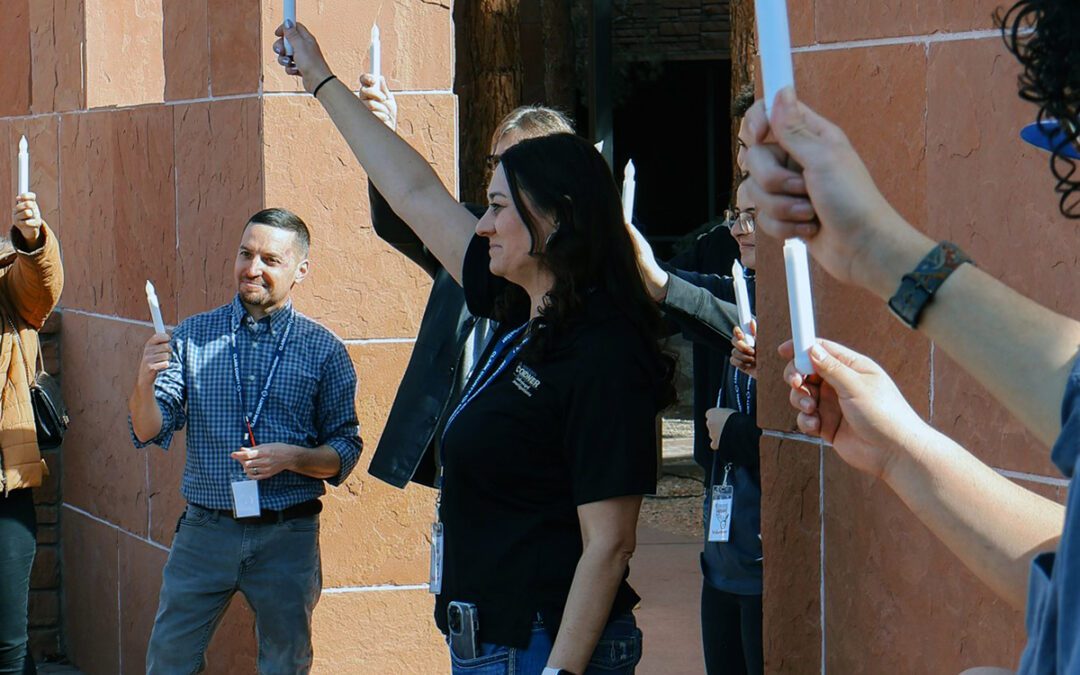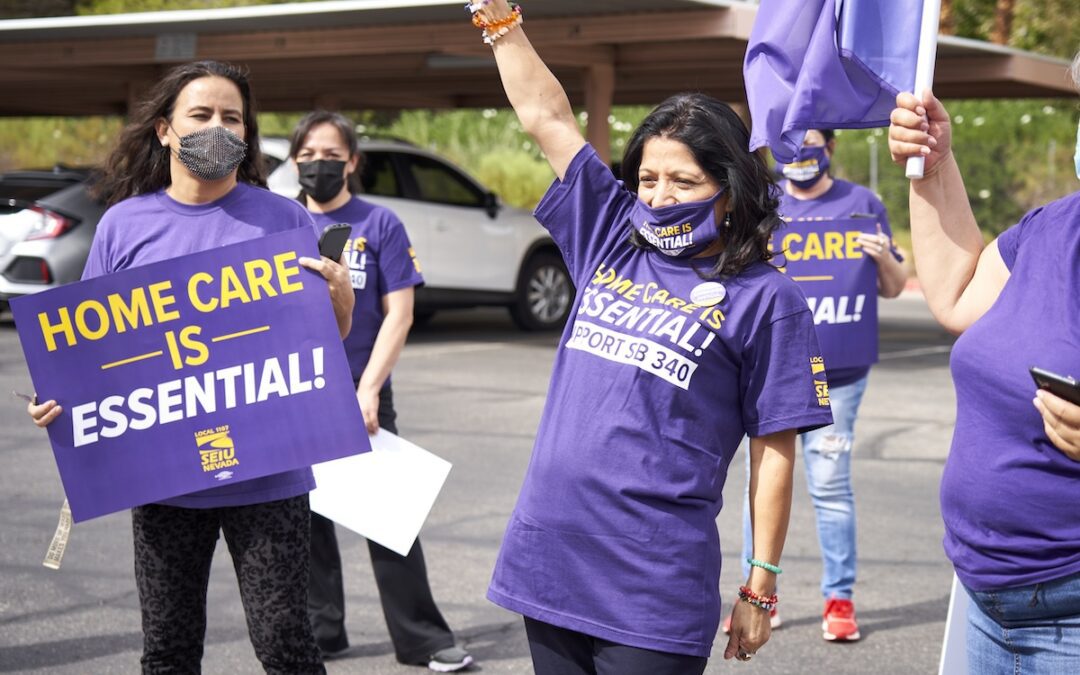
Graphic by Francesca Daly
One year ago today, the Inflation Reduction Act (IRA) was signed into law.
The legislation represented the largest-ever investment in fighting climate change, lowered health care and prescription drug costs, raised taxes on corporations, and boosted funding for the Internal Revenue Service to go after wealthy tax cheats.
The bill was passed with only Democratic votes—including Nevada Senators Jacky Rosen and Catherine Cortez Masto—with every Republican in Congress voting against it, despite its potentially transformative impact on the economy and the nation’s clean energy infrastructure.
“The Inflation Reduction Act was one of the most consequential pieces of legislation passed in decades, and in just one year it’s already paying huge dividends for the American people, for our economy, and for our climate,” Senate Majority Leader Chuck Schumer (D-NY) said in a statement. “Democrats are proud of the progress we’ve made in implementing our agenda, and we will keep working until every American feels the benefits.”
Here are some highlights of how the Inflation Reduction Act has impacted Nevada:
Lower Health Care and Prescription Drug Costs
The Inflation Reduction Act extended generous subsidies that helped make Affordable Care Act (ACA) health insurance plans more affordable for working- and middle-class families.
Those subsidies were introduced as part of Biden’s American Rescue Plan of 2021, and were set to expire at the end of last year, but the IRA extended them through the end of 2025.
Roughly 21,000 Nevadans were set to lose their individual coverage and become uninsured had those subsidies expired at the end of 2022, but thanks to the Inflation Reduction Act, those people got to keep their insurance.
The IRA also reformed Medicare to lower drug costs for many of the 427,330 Nevada seniors with Medicare Part D coverage, which covers prescription drugs.
For example, beginning this past January, all vaccines covered under Medicare Part D are free, and the bill implemented a $35 monthly cap on insulin for Medicare recipients.
As a result, nearly 11,000 Nevada seniors on Medicare who use insulin are now charged no more than $35 per month for an insulin prescription.
The IRA will also implement a $2,000 cap on Medicare recipients’ annual out-of-pocket prescription drug costs, beginning in 2025. In Nevada, an estimated 143,020 seniors are expected to save $434 a year each due to this provision, according to an analysis by the US Department of Health and Human Services.
Fighting Climate Change and Saving Families Money on Energy
Arguably the most critical element of the IRA is its provisions to reduce emissions that cause climate change and drive extreme weather events. The law aims to do this by establishing a mix of tax credits for companies and rebates for consumers in order to make the manufacturing and consumption of clean energy technologies and products cheaper.
In other words: by making clean energy—like solar, wind, and hydropower—cheaper to produce and use, the IRA seeks to hasten the transition away from fossil fuels that are one of the biggest sources of emissions.
For example, under the law, manufacturers get subsidies for building electric vehicles (EVs) and renewable energy products, and utilities get credits for choosing solar and wind energy over fossil fuel plants.
The law’s various measures are expected to lead to a clean energy jobs boom and the IRA could create up to nine million jobs over the next decade. In Nevada, the IRA could create as many as 12,251 jobs by 2030, according to data from the Rocky Mountain Institute.
In Nevada, several manufacturers have already taken advantage of the IRA’s incentives.
Earlier this year, Tesla announced that it plans to launch a new, $3.6 billion advanced manufacturing project in Northern Nevada for its semi truck and batteries. The project will create two new facilities: one will be a high-volume factory for electric semi trucks, and the other will be a 100-gigawatt-hour factory for Tesla’s 4680-type battery cells. The project is expected to create 3,000 jobs in Nevada, according to the company.
In February, Redwood Materials, a battery-recycling startup, obtained a $2 billion loan commitment from the Dept. of Energy, in part thanks to the Inflation Reduction Act. The company will use the loan to build out a battery recycling facility in Reno which will take “end-of-life” electric vehicle batteries and automotive production scrap, process them, and churn out raw materials and products that will then be used to make new EV battery cells. The facility is expected to create “3,400 good-paying construction jobs and employ approximately 1,600 full-time employees,” according to the company.
The IRA also provided $80 billion in financial rebates for millions of households to adopt those clean energy products, such as electric vehicles, solar panels, and more efficient heat pumps.
If consumers claim all the subsidies offered in the law, they could save more than $1,800 on their annual energy bill on average, according to an analysis by Rewiring America, a climate analysis group.

New strain of bird flu is detected in a Nevada dairy worker, CDC says
By Mike Stobbe and Jonel Aleccia According to state health officials, the dairy worker was exposed at a farm in Churchill County, in the west...

Iluminan de rojo, verde, amarillo y negro letrero de bienvenida a Las Vegas para celebrar “Black History Month”
Las 89 luces del letrero Welcome to Fabulous Las Vegas Nevada se tornaron rojas, verdes, amarillas y negras para festejar el Mes de la Historia...

You may qualify to file your taxes for free in Nevada—here’s how
An estimated 490,000 Nevadans will be eligible to use the IRS Direct File program to file their taxes this year. Nevadans have some good news this...

Struggling with your mental health after surviving a disaster? Here’s how to look after yourself
By MARIAM FAM Associated Press There's the initial shock and chaos in a collective disaster like the deadly and destructive California wildfires....

El “Día de Desaparecidos en Nevada” del Condado Clark reúne familias y cierra un ciclo de dolor
Resultados preliminares destacan la localización de dos personas vivas que habían sido reportadas como desaparecidas, una de ellas separada de su...

Wage increase shows early success in stabilizing Nevada home care workforce
Seniors have officially outnumbered children for the first time in US history. But Nevada's new minimum wage increase for care workers offers a...



